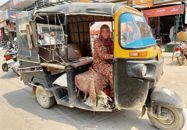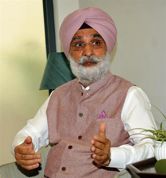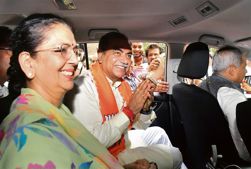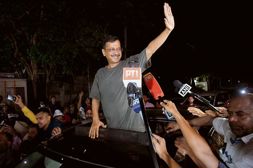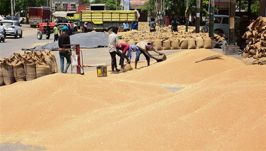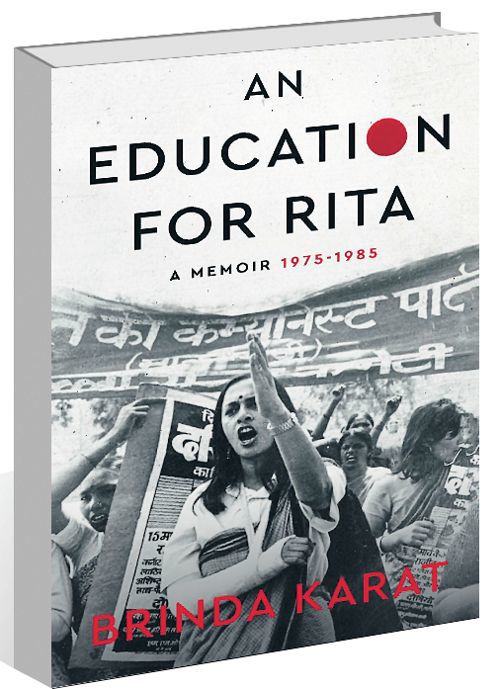
An Education For Rita: A Memoir 1975-1985 by Brinda Karat. Leftword Books. Pages 206. Rs 350
Neera Chandhoke
This is a charming and readable memoir of the remarkable Brinda Karat, who successfully made the transition from an upper-class, English-speaking, charismatic young woman to a full-time activist of the Communist Party of India (Marxist). In working class localities, she came to be known as Rita. Brinda skilfully weaves an absorbing personal story and biographies of her extended family with pencil sketches of redoubtable Marxist leaders. Regrettably, we do not come to know enough of the man she married, Prakash Karat, who held important positions in the CPI(M), and who directed the course of the party for many years. Since Brinda’s story ends in 1985, we also do not acquire any insight into the decline of the party. This is a matter of some disappointment because we, once the fellow travellers of the left, continue to wonder what happened to a party that could have provided an alternative to the bigoted religious right.
Today, the left is nowhere on the electoral horizon, except in Kerala. In Bengal, it has been replaced by a personality-based formation, and in Tripura, the political system is shredded beyond belief. This is a pity because whatever problem we may have with the practices of the left, its understanding of politics and political parties is of enormous significance. Consider what P Sundarayya said to Brinda in 1976: “[t]he role of the individual in the communist movement is important. But always remember, a leader is as tall as the party is. If the party does not grow, it matters little if an individual’s stature grows.”
“Important words,” writes Brinda, “to recall now especially when bourgeois parties promote cults around individuals.” Communist parties are, arguably, different because their main task is to mobilise people and deepen the understanding of what is due to citizens. Perhaps the CPI(M) declined because its role as a party in power overshadowed its role as a transforming force in the lives of people. Brinda does not comment.
In this volume, she details her work in the trade union of the textile industry in Delhi and in working class colonies. Trade unions took a hard knock during Emergency, but she and other activists persevered. Expectedly, her focus on trade unionism came under fire by P Sundarayya. He, she recounts, sat her down and told her that she was becoming a victim of economism, a term used by Lenin to criticise trade unions that only concentrated on monetary benefits. “You can,” said PS, “address as many gate meetings as you wish, but it won’t make any different to the class struggle unless you prioritise introducing workers to socialist ideas and to the party. That requires sustained hard work and immense dedication.” Subsequently, Brinda, along with colleagues, concentrated on expanding their constituency to areas beyond the neighbourhood of textile workers in Delhi. She writes of the strikes that erupted during the Janata period, and the failure of leaders of the Janata front to recognise the importance of workers’ rights.
But that is the nature of bourgeois democracy. In the West, trade unions have secured benefits from capitalist governments through a combination of strikes, negotiations, voting strategies and alliances with the agrarian classes and social democratic parties. In India, trade unions have, till now, neglected migrant workers, who form an overwhelming majority of the working class.
There are other problems that communist parties have had to deal with. Brinda records that her organisational work in the party and her trade union activism failed to create a political constituency among workers. The CPI(M) did not get their votes. The leadership had a mechanical understanding of class struggle and little understanding of social hierarchies of society, caste and gender. “We somehow assumed that the unity engendered by the struggle on common issues would automatically translate into class consciousness.” The gender issue was resolved, somewhat, when the All India Democratic Women’s Association was set up. The caste issue remains to be tackled.
Reading Brinda Karat’s memoir was a deeply personal experience for me, as it will be for Delhi University colleagues of the 1970s, 1980s and 1990s. We marched and demonstrated alongside the party, wrote for Social Scientist, mourned the loss of Safdar Hashmi, participated enthusiastically in SAHMAT, and religiously voted for the CPI(M) candidate in DUTA elections. Yet, we were wracked by a niggling doubt. The principal contradiction between communist parties and the bourgeois system is overshadowed by factionalism within the movement. In 1964, the movement split between the Communist Party of India and the CPI(M). Within three years, the CPI(M) was fractured by the breakaway Communist Party Marxist-Leninist.
Charu Majumdar had challenged the party leadership on every front, from its analysis of Indian society to its strategy for dealing with an impoverished peasantry. He attacked the party for rescinding on Marxist ideology and a strategy that was irrelevant for India. As Naxalism presented to the youth a new political imaginary, students and young professionals left their privileged niches and joined the armed struggle. Many of them abandoned the movement fairly quickly because they were disillusioned by the focus on violence, but the divide had knocked the bottom out of the revolutionary credentials of existing communist parties. This occurred before the time period of Brinda Karat’s personal/political history. But I wish she had addressed an obviously unsettling experience for communist politics. Another volume, Brinda?
Join Whatsapp Channel of The Tribune for latest updates.






